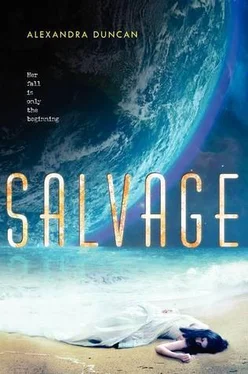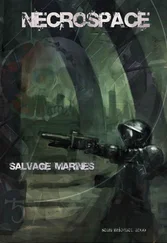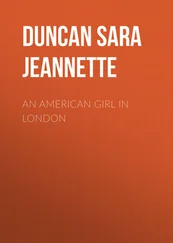“You mean . . .” I frown down at the coins and then take in a sharp breath when I grasp what he means. “Oh. Right so.”
“I’ll wait out here for you.”
“You don’t need to.” I clutch the coins. He’s done enough. More than enough.
Rushil arches an eyebrow. “Maybe I want to.”
My face goes hot. “I’ll . . . I’ll be back soon,” I stammer, and hurry into the office without looking back.
“Identification?” The middle-aged woman behind the desk at the labor placement office taps at her trackboard without looking up. Her black hair sweeps up from her forehead into a gravity-defying pouf.
I slide my new tag across the metal counter. It comes up to my shoulders, even though I’m standing.
“Any documentation of work history?” the woman asks without looking away from her screen.
I look down at the countertop, smudged with fingerprints from all the people who’ve stood in this same spot before me. “No, so missus.”
She holds my card out at arm’s length, then narrows her eyes and looks from it to me. Damn. Of course I would get the one screener who isn’t sloppy.
“Please, so missus.” I keep my voice low and lean close as I can. My heart picks up a sickly, too-quick beat. “I’ve got a smallgirl to watch out for.”
She frowns at me. I can tell she’s trying to figure my age, pick out my life story from my face and clothes, and she doesn’t like what she sees. Is this the time? I turn over the coins in my palm. What if it isn’t enough? Or what if she thinks it’s dirty what I’m doing and starts yelling like that woman chasing the thief? She has my tag. I’ll have to run out of here and leave it behind, and then I’ll be stuck without work and even more in debt to Rushil.
I place the coins on the counter, and slide them across to her.
“There’s got to be something,” I say.
She looks at me sharply, the swipes up the coins and pockets them. I let myself breathe.
“Very well.” She looks back at her machine. “Entry level, low-skill jobs. I have a laundry aide at a state end-of-life facility. Sorter at an electronics recycling plant. Powell-Gupta Dynamic needs a chai wallah, and there’s a synthetic diamond manufacturer on the east side that wants a chemical stripping assistant.”
“Which one pays the best?” I ask.
“Chemical stripping assistant.” She looks level at me and some of the formality drops out of her voice. “But those fumes will strip your lungs, too. That job will age you twenty years in a month. I wouldn’t take it if I were you, not if you have a little one to look after.”
“Which one would you take?” I ask cautiously.
“Chai wallah,” she says without missing a beat. “It’s not the best pay, but it’s down in a good part of the south city and you’ll be safe. It’ll help you build up a work history.” She gives me a meaningful look.
“Right so,” I say, even though I don’t have a clue what a chai wallah does. “I can do it.”
Her machine clicks and spits out a thin plastic card. “You start the day after tomorrow. Scan this with your crow, and it’ll direct you to Powell-Gupta. Feed it into the exterior lock system, and the building will show you where to go from there.”
“Crow?” I repeat. None too much of what she said makes sense, but that part I didn’t understand at all.
The woman holds up her handheld, a shiny, berry-red machine the size of her palm. “Your crow,” she repeats, as if I’m slow. She looks me over. “And see if you can’t pull together some more professional clothes. You look like you stumbled off a waste freighter.”
“Right so.” I take the card.
“Welcome to the workforce, Miss Parastrata.”
“Thank you.” I clutch my ID tag and the employment card to my chest as I hurry past the line of people waiting for jobs and out into the afternoon sun.
I spot Rushil sitting in the shade of a tree, thumbing through his handheld—I mean crow—and I can’t help but smile. Because the tag worked. Because I’m going to pay him back. Because finally, finally, something is going right.
A chai wallah turns out to be a type of servant who runs tea to everyone too important to leave his or her post, some like the man with the tray I saw on the train when Miyole and I first got here. I’m not the only one at Powell-Gupta, which has an entire black-glass tower to itself on the outskirts of south Mumbai. Each floor gets its own chai wallah, dressed in white pants, an acid-green shirt, and a saffron neckerchief, the company’s banner colors. At least the woman at the employment office ended up being wrong about needing to buy new clothes. I tuck my data pendant beneath the scarf and leave my street clothes in the narrow hall where we workers can store our things during the day.
“You make the tea, you set up the cart, you bring the tea.” Ajit, the senior chai wallah, leads me though the kitchens in the basement. He can’t be too many turns older than me, but all his teeth have gone brown. “You see if they want anything else, and if they do, you get it for them quick as you can.”
Dayo, an older woman with dark skin and a lilting touch to her words, looks up from her cart. “What Ajit means is, you do whatever anyone says and you don’t foul up.”
Ajit glares at her. “Do you want to do the training?”
“I’m only telling her how it is.” Dayo raises her hands in mock surrender.
“How about you get up to fourteen and do your job instead of trying to do mine?” Ajit says.
Dayo shakes her head and continues setting out the thick glass cups on her cart.
Ajit gives me a cart of my own, complete with a silvery urn of tea, cups, a warming compartment full of damp towels so the people I serve can clean their hands, and a data pad where I can take down any requests.
“I’m giving you twenty-seven,” Ajit calls over his shoulder as I trundle after him to the service lifts. “That’s an easy start. When you’re done we’ll check your times and see if you’re ready for something more challenging.”
“You’re timing me?” I pause midstep. The cart squeaks a meek protest.
“Of course.” Ajit turns. “Pay scale’s based on your efficiency rating. Didn’t I say that?”
I stare at him warily. “No.”
Ajit shrugs. “Chop chop, then. Clock’s running.”
My cart and I ride the service lift up to the twenty-seventh level. The tiny block of numbers at the bottom of my data pad climb higher and higher with the seconds. How long is too long? I hate leaving Miyole alone, even though she’s some used to it. This city feels different from the Gyre, as if it might eat her up when I’m not looking. But we need money. We can’t keep living off Rushil. I can’t afford to be slow.
The lift doors open on a glare of light and a waft of cool air. A wide room with an expanse of floor-to-ceiling windows spreads out in front of me, crammed with a maze of desks and man-high frosted-glass partitions. A man or woman sits at each post, poised above a data entry screen, fingers flying, or talking into the onscreen feed receiver bolted upright at each station.
“Finally.” One of the women spins around in her chair and eyes my cart. She waves me closer. “Miss! Miss?”
I wheel my cart over to her. “Tea, missus?”
Читать дальше












